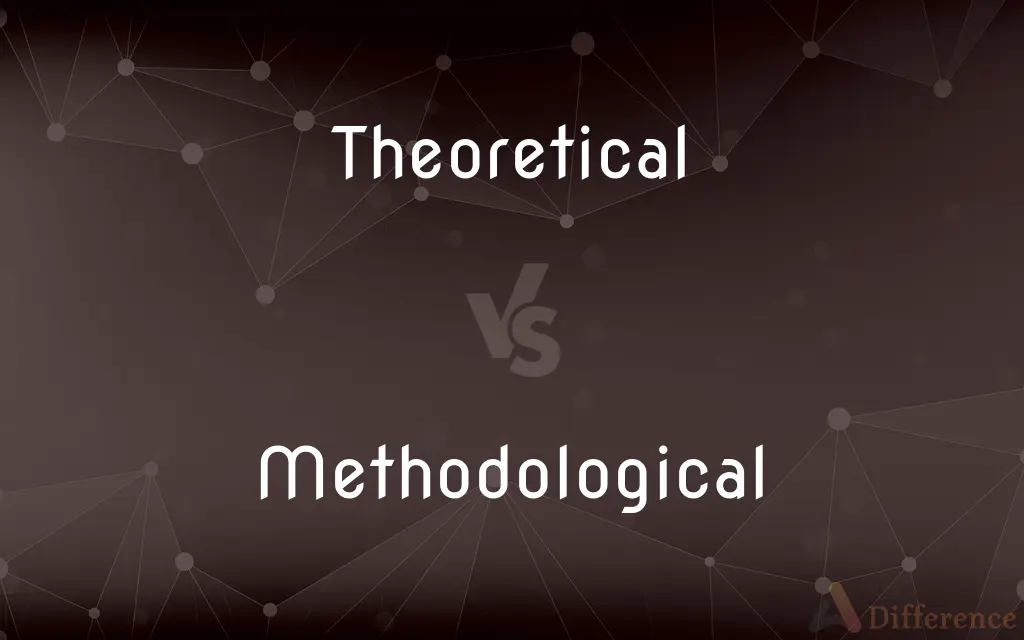Theoretical vs. Methodological — What's the Difference?
By Urooj Arif & Maham Liaqat — Updated on March 29, 2024
Theoretical involves abstract concepts and frameworks in understanding or explaining phenomena, while methodological pertains to the systematic approaches used in conducting research or analysis.

Difference Between Theoretical and Methodological
Table of Contents
ADVERTISEMENT
Key Differences
Theoretical approaches focus on developing and utilizing concepts, theories, and frameworks to understand or explain various phenomena. These theories provide a lens through which researchers can interpret data and phenomena, often guiding the direction of inquiry and the formulation of hypotheses. On the other hand, methodological approaches are concerned with the specific techniques, strategies, and procedures used in conducting research, including data collection, analysis, and validation methods.
In the realm of academic research, a theoretical perspective might influence the selection of a methodological approach, indicating how theories can shape the design of studies and the interpretation of their outcomes. Whereas, methodological choices can, in turn, influence the development and refinement of theories based on empirical evidence and research findings, showcasing a dynamic interplay between theory and method.
Theoretical work is often more abstract, aiming to construct and refine general principles that explain or predict phenomena across different contexts. Methodological work, however, is more practical, focusing on how to effectively gather and analyze data to test hypotheses and theories, ensuring research reliability and validity.
Researchers may start with a theoretical framework to conceptualize their study, defining key concepts and hypothesized relationships. Subsequently, they select appropriate methodological tools and techniques that align with their theoretical orientation and the specific requirements of their research question, demonstrating how both aspects are crucial in scholarly work.
The evaluation of research often involves scrutiny of both its theoretical and methodological components. A strong theoretical foundation provides clarity and depth to the research purpose and questions, while a robust methodological approach ensures that the study is conducted rigorously and the findings are credible and generalizable to a certain extent.
ADVERTISEMENT
Comparison Chart
Focus
Abstract concepts and frameworks.
Systematic approaches and procedures.
Purpose
To understand or explain phenomena.
To conduct research or analysis.
Nature
Abstract and conceptual.
Practical and procedural.
Influence on Research
Guides the direction of inquiry and interpretation.
Determines the techniques for data collection and analysis.
Outcome
Development of theories and frameworks.
Execution of research and analysis methods.
Compare with Definitions
Theoretical
Involving abstract concepts not immediately applicable.
Theoretical physics often deals with concepts beyond everyday experiences.
Methodological
Related to the methods used in research or analysis.
Her methodological approach was rigorous, ensuring the reliability of the results.
Theoretical
Guided by existing knowledge to formulate new hypotheses.
Theoretical frameworks in psychology guide the development of new hypotheses about human behavior.
Methodological
Concerned with the tools and techniques for data collection.
Methodological choices include qualitative interviews and quantitative surveys.
Theoretical
Based on speculation rather than practical application.
Theoretical models predict outcomes that require empirical testing.
Methodological
Focused on analysis and interpretation methods.
Methodological innovations have improved the analysis of complex data sets.
Theoretical
Pertaining to theories or the development of ideas to explain phenomena.
His theoretical work on social dynamics has influenced many researchers.
Methodological
Involving the systematic planning of studies.
Methodological design is crucial for the success of empirical research.
Theoretical
Aimed at understanding principles.
Theoretical studies in economics explore the underlying principles of market behavior.
Methodological
Emphasizing the reproducibility and validity of research.
Methodological rigor enhances the credibility of research findings.
Theoretical
Concerned with or involving the theory of a subject or area of study rather than its practical application
The training is practical rather than theoretical
A theoretical physicist
Methodological
A body of practices, procedures, and rules used by those who work in a discipline or engage in an inquiry; a set of working methods
The methodology of genetic studies.
A poll marred by faulty methodology.
Theoretical
Of, relating to, or based on theory.
Methodological
The study or theoretical analysis of such working methods.
Theoretical
Restricted to theory; not practical or applied
Theoretical physics.
Methodological
The branch of logic that deals with the general principles of the formation of knowledge.
Theoretical
Studying or working to develop theory.
Methodological
Of, pertaining to, or using methodology or a methodology.
Theoretical
Of or relating to theory; abstract; not empirical.
Methodological
Of or pertaining to methodology.
Theoretical
Concerned primarily with theories or hypotheses rather than practical considerations;
Theoretical science
Methodological
Relating to the methodology of some discipline;
Methodological errors
Theoretical
Concerned with theories rather than their practical applications;
Theoretical physics
Theoretical
Based on specialized theory;
A theoretical analysis
Common Curiosities
Can a study be both theoretical and methodological?
Yes, many studies integrate both aspects, using theoretical frameworks to guide research questions and methodological approaches to collect and analyze data.
Why is it important to have a theoretical framework in research?
A theoretical framework provides a structured way to understand and explain phenomena, guiding the research process and interpretation of results.
How do theoretical perspectives influence methodological choices?
Theoretical perspectives can dictate what phenomena are studied, which in turn influences the selection of appropriate methodological tools for data collection and analysis.
What is an example of a theoretical contribution?
Developing a new theory of social interaction based on empirical evidence and existing literature can be seen as a theoretical contribution.
What is an example of a methodological contribution?
Introducing a new statistical technique for analyzing data more accurately in psychological research can be considered a methodological contribution.
What role does methodology play in validating theories?
Methodology provides the tools and procedures to empirically test theories, helping to validate or refine them based on research findings.
How do theoretical and methodological aspects interact in research?
Theoretical frameworks guide the direction and purpose of research, while methodological approaches determine how research is executed and findings are analyzed.
Why is methodological innovation important in research?
Methodological innovation can improve the efficiency, accuracy, and scope of research, allowing for the exploration of new questions and the collection of more reliable data.
What is the difference between theoretical and methodological research?
Theoretical research focuses on developing and refining concepts and theories, while methodological research focuses on the systematic approaches and procedures for conducting research.
How do researchers choose methodological approaches?
Researchers choose methodological approaches based on their research questions, theoretical frameworks, and the nature of the data they aim to collect and analyze.
Share Your Discovery

Previous Comparison
Partner vs. Pardner
Next Comparison
Ancillary vs. CorollaryAuthor Spotlight
Written by
Urooj ArifUrooj is a skilled content writer at Ask Difference, known for her exceptional ability to simplify complex topics into engaging and informative content. With a passion for research and a flair for clear, concise writing, she consistently delivers articles that resonate with our diverse audience.
Co-written by
Maham Liaqat













































